
Max Planck Institute for Chemical Ecology
The Max Planck Institute for Chemical Ecology in Jena investigates the role, diversity and characteristics of chemical signals which control the interactions between organisms and their environment. Scientists from the fields of ecology, biochemistry, organic chemistry, entomology, ethology, and insect physiology work closely together in the Institute in order to understand the complex system of chemical communication. Their research focuses on the co-evolution of plants and insects. The fact that plants usually spend their entire lives in one place forces them to use effective strategies to guarantee that their offspring are spread and also to protect themselves against pests and diseases. To this effect, plants have developed a wide range of chemical signalling compounds that enable them to optimise their adaptation to their respective environments. These so-called allelochemicals are used to, among other things, attract pollinators, fend off herbivores and pests, fight diseases and keep unwelcome competitors away. Plants also synthesise mixtures of many organic substances that have a deterrent or toxic effect on herbivores. As a countermeasure, insects that feed on plants adapt accordingly and, for their part, try to overcome plant defences.
Contact
Hans-Knöll-Straße 807745 Jena
Phone: +49 3641 57-0
Fax: +49 3641 57-1002
PhD opportunities
This institute has an International Max Planck Research School (IMPRS):
IMPRS on Chemical Communication in Ecological SystemsIn addition, there is the possibility of individual doctoral research. Please contact the directors or research group leaders at the Institute.









